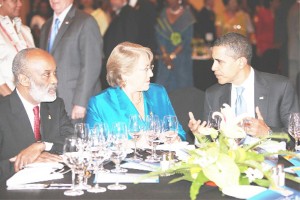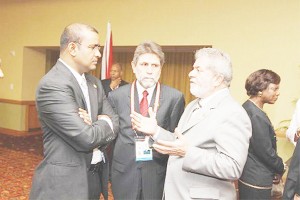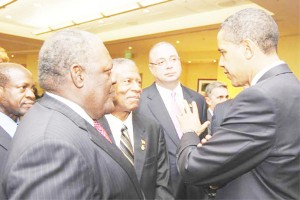-though declaration only adopted
Host Prime Minister, Patrick Manning praised the spirit of cooperation between hemispheric leaders as deliberations wrapped up in Trinidad yesterday, even as they failed to reach a consensus on the Draft Declaration of Port-of-Spain.

The contentious declaration, which had earlier been rejected by members of Venezuela-led ALBA, was signed only by Manning on the advice of the leaders, as they agreed to adopt rather than endorse it.
Manning referred to the declaration as a “compromise” as he announced that it failed to draw the approval of all 34 Heads of State attending the summit. He stated that it was unlikely the declaration would have included every issue raised by leaders when its contents were being discussed, but emphasized that the pertinent issues were drafted in.
Guyana’s President Bharrat Jagdeo added his voice to the criticisms of the declaration on Saturday night during a press briefing at the summit saying that it incorporates “too much”, but he noted that he was prepared to sign the declaration.
Jagdeo said that what the region needs is a few big, bold initiatives that would catapult it forward, and “not the mundane, evolutionary transformations” as there is too much poverty and illiteracy in the hemisphere.
Prime Minister Manning confidently declared in a closing speech yesterday that the deliberations in Trinidad have heralded the dawn of a brighter, newer day.
Manning spoke of a genuine sense of goodwill among leaders outside of the friction, noting that the summit had ended on a positive note despite reports of it possibly being derailed by the agenda of individual countries.

His sentiments were echoed by US President, Barack Obama, who held a press conference simultaneously with Manning’s closing briefing. Obama told the news conference that while he did not see eye-to-eye with every regional leader on every issue and, “does not agree with everything that was said”, he was gratified with the commitment to work together respectfully.
The US President made a point of noting that when regional leaders spoke of Cuba’s assistance in the area of healthcare, it served as reminder to the US that its interaction in the hemisphere must be encompassing of an intelligent use of its diplomacy, and not simply its drug interdiction and military interventions.
Obama added that the US must be cognizant of developing connections in the hemisphere that over time will increase its influence and have a beneficial effect.
Haiti
Summit leaders have agreed to address issues in Haiti, which were discussed over the past few days as a priority. Haitian President Rene Preval outlined a development plan for his country to the leaders during a retreat yesterday.
Manning said yesterday that what exists in Haiti today is not a credit to the leaders in the hemisphere, adding that, “none of us can feel comfortable that Haiti exists in your backyard.

The summit deliberations within the past few days reflected the spirit to work together, but at the same time, leaders emphasized individual concerns that are to be addressed as the discussions move ahead from Trinidad.
Canadian Prime Minister, Stephen Harper has committed Canada to doubling its subscription to the Inter-American Development Bank and increasing its lending capacity. He noted that the cost of the economic crisis was being borne by developing countries and declared that the existing status quo cannot be maintained. Harper spoke of citizens losing jobs and the need for countries to resist protectionism.
Jamaica’s Prime Minister Bruce Golding also talked about the loss of jobs in Jamaica and other Caribbean countries.
He noted that his government was struggling to provide a safety net in the face of climbing debts. He noted too that his country was facing cutbacks in production, declining exports and a significant erosion in foreign exchange; issues facing every other Caribbean nation.
Brazilian President Luiz Inacio Lula da Silva spoke about the need for all countries to get involved in global economic issues. He also announced that Brazil has made a decision to lend money to the International Monetary Fund (IMF).
There was also a call for a moratorium on the debts facing developing countries, and for there to be a G192 as opposed to the G20.
Venezuela’s President Hugo Chavez issued a call for all countries participating to be treated with respect while noting that Cuba deserves equal treatment in the hemisphere. Chavez also proposed that the next summit of the Americas be held in Cuba, which he again stressed was excluded from the event.
And Bolivia’s President, Evo Morales called for an immediate change in global economic policies saying that the neo-liberal system has wrecked many economies in Latin America. He said that there needs to be a change in international relations in the region as well as economic relations.




